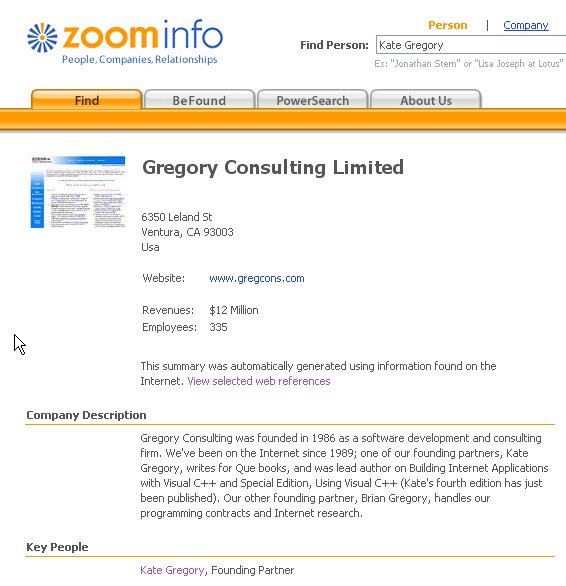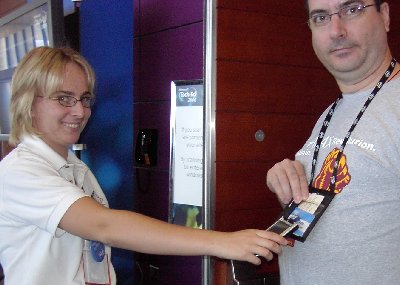 Thursday, 22 June 2006
One of the huge holes in the current version of SharePoint is workflow. If you have a document that starts out as a draft, and then the author decides it's ready to be approved, and then someone approves it and it goes to a more public status, that's workflow. And it's not supported in the SharePoint (either WSS or SPS) you can "buy" today. (WSS is free with Windows Server 2003, so I put "buy" in quotes.)
This hole is going to be fixed in the next version of SharePoint. The team has a blog and has posted a quick summary of what workflow will be like and just how much will come to you "out of the box." Check this list:
To help people get started with scenarios like these, we’ve taken some common processes we’ve seen in our research and built those workflows into SharePoint Server 2007 out-of-the-box for people to use without IT involvement.These out-of-the-box workflows include:
- Approval: Routes a document for approval. Approvers can approve or reject the document, reassign the approval task, or request changes to the document.
- Collect Feedback: Routes a document for review. Reviewers can provide feedback, which is compiled and sent to the document owner when the workflow has completed.
- Collect Signatures: Gathers signatures needed to complete an Office document. This workflow can be started only from within an Office client.
- Disposition Approval: Manages document expiration and retention by allowing participants to decide whether to retain or delete expired documents.
- Group Approval: Similar to the Approval workflow, but uses a designated document library and offers a personalized view of the approval process(es) in which a user is participating. This workflow provides a hierarchical organization chart from which to select the approvers and allows the approvers to use a stamp control instead of a signature. This solution was designed specifically for East Asian Markets.
- Translation Management: Manages document translation by creating copies of the document to be translated and assigning translation tasks to translators.
- Issue Tracking: Manages the issue tracking process by creating tasks for Active issues assigned to users who own to a given issue. When the task related to an issue is complete hence resolving the issue, the creator of the issue is assigned a review task so that the issue can be closed.
Think about what you will be able to take care of with this! Do you want the beta? Of course you do. And there's a whole new Enterprise Content Management blog to talk about all of this in greater detail, too.
Kate
 Wednesday, 21 June 2006
There is growing awareness that making software takes a lot more than just making code. Certainly being a developer is much more than being a coder. But as someone who runs a consulting business, I certainly know that for me and for my people to make great code for our clients, we need support from non developers. This isn't just about testing and UI design and documentation either. It's about calling the courier, getting a new mouse when yours dies, making sure there's cold Coke in the fridge all the time, and plenty of paper in the printer. Sure, developers can do all that stuff... but they make more code, bill more hours, and give better advice and mentoring when they don't have to do that stuff. In fact, Joel Spolsky says about 80% of your payroll, in a software development company, should go to people who don't actually develop software. Yikes! Our "overhead" is nowhere near that here at Gregcons, but we do have folks on staff who never ever write code of any sort. It's important to remember what a vital role everyone in a small company plays, whether we bill for their time or not.
Kate
 Tuesday, 20 June 2006
Poking around on ZoomIn, I see what it thinks about my company:

The bio stuff is a little out of date, but ok. But wait a minute... apparently over $10 million dollars a year, and almost 330 people, are headed to somewhere in California on a regular basis, instead of here in the lovely Ontario countryside. Can I get a redirect?
Kate
 Monday, 19 June 2006
This year at Tech Ed USA, the booths had slightly different badge scanning hardware than at past shows. Instead of removing your badge from the holder to be swiped, the boothies could just swipe a bar code on the front. This was used not just at booths, but also for session attendance. Here you see Canada's Technology Triangle guy himself, Dave Totzke, being swiped before my Friday talk:

I know at other TechEds they have used RFID in the badges, and then when you go to do evals you can choose from the sessions you actually attended: makes it easier for attendees and gets an accurate count of attendance. I don't know if session attendance and evals were linked here because I hardly attended any sessions at all. In fact, for those I did attend, I arrived with the speaker before the badge swipers so I never got swiped. I know looking at my own evals they told me how many evals were submitted but not how many people were in the room.
Knowing how many people actually attend sessions and comparing it to how many indicated they would in the scheduling tool helps to put talks into the right rooms... it's as awkward to talk to a cavernously empty room as to a busting-at-the-seams-full one. So I like this. But then, I liked the RFID chip, and I've been told it would never be accepted in North America.
BTW, little piece of language-specific trivia: apparently C++ talks get way more "didn't put it in the schedule" attendees than other languages. Is it because all languages get the same number of spontaneous dropins, and all the C++ folks who planned to attend follow through? Is it because C++ people don't like to use the scheduler? Who knows? I'm just happy that while the number of C++ talks may be less than in previous years, I'm still not in the smallest room.
Kate
 Sunday, 18 June 2006
Another entry from the VC++ team. This one covers many of the IDE changes I showed in my recent Tech Ed talk. One of the questions that arose in that talk was "why does Visual Studio sometimes appear to freeze when I open a dialog?" Boris Jabes has an answer that explains to me why it's more likely to happen when I'm working in native code.
Kate
 Saturday, 17 June 2006
Chris Sells did something pretty cool recently - he went to a printing plant to see how books are printed and bound. He arranged to go on the exact (single) day they were printing HIS book, and he took both his kids and his camera. The result is one tremendously cool blog entry.
If I am ever talked into another book (it could happen  ) I think I want to do this too. ) I think I want to do this too.
Kate
 Friday, 16 June 2006
Joel Spolsky has a nice article today about Bill, inspired by the retirement announcement of course. I loved this story for two reasons. The first is when he started talking about the leap year thing in Lotus 123, I was right there with him -- I had problems with that myself over twenty years ago. The second is the "little girl" sound effects and thought balloons injected into the story. Times change. Companies change. People retire. These things don't necessarily cause each other. Read the story.
Kate
 Thursday, 15 June 2006
TechEd is about so much more than the sessions and the parties. It's about spontaneous conversations on the bus, in the meal hall, or while waiting somewhere with groups of people. It's about watching other people react to learning something you've known for months or years. It's about finally getting around to learning something yourself that you never had time for. But that's not the whole of it for me.
Three little vignettes are kicking around my head this morning. The first is a memory from another TechEd, in Barcelona three years ago. I remembered this when I was ironing my speaker shirts for this year. In Barcelona, the hotel rooms had no irons in them, so I was headed to the speaker room in a TShirt to iron my speaker shirt. On the way Juval told me this joke:
A group of people are on a plane when the engines cut out and the pilot asks everyone to brace themselves for an emergency landing. There is some screaming and crying, then a woman stands up and yells "we're all going to die! Is there no-one on this plane who can make me feel like a woman one more time?" At that a man in the last row jumps to his feet and runs toward her. As he runs down the aisle he rips off his shirt revealing a handsome physique. She is beaming and the other passengers are distracted from their impending doom. When he reaches her row, he throws the shirt at her and says to her "Quick, IRON THIS!"
This year's TechEd memory will have to be the hotel evacuation Wednesday night. I have heard many variations on the story from those of us who were there, including people who tried to answer their phones, turn off their alarms, and so on. I also enjoyed sharing stories of what we grabbed. I put my laptop in my bag -- after all I still have a session to give -- and threw a few other things in quickly, but left my power supply and other things that would take more than a quick grab. And you better believe I slipped my shoes on and grabbed my badge, where I keep my hotel key. It was a long slow shuffle all the way down from the tenth floor, but I wasn't worried... I couldn't smell or hear anything unusual so I was pretty sure there wasn't much wrong. Turns out a water leak drew down the pressure enough to disable the sprinkler system, and that meant we all needed to get out.
And today's surreal news, from the conference site:
Information About Limited Measles Outbreak in Boston
The Tech·Ed 2006 Planning Team wants to inform you that there has been a small outbreak of measles in the Boston downtown area. The majority of the known cases have been in workers from the John Hancock building in downtown Boston who were not inoculated with the MMR vaccine or had not been exposed to the virus as children. While the risk of exposure to the measles virus while at Tech·Ed is extremely low, the best prevention against the virus is to ensure you have been inoculated. If you are not sure if you have been inoculated, contact your health care provider. Thank you.
I've already had measles, so I'm not worried.
Kate
 Wednesday, 14 June 2006
Over on the Visual C++ team blog, Martyn Lovell muses about MSBuild, renaming all the library DLLs, and STL/CLR, among other things. On that topic, he says:
We’re not finished yet on performance, but in informal testing we’ve seen some exciting results, including a bunch of cases where the magic of templates combined with the C++ optimizer are able to outperform the .NET Base Class Library even in verifiable code. When we envisioned C++/CLI several years ago, these are the kinds of scenarios that we dreamed of, and it’s exciting to see them coming to fruition.
Can't wait!
Kate
© Copyright 2026 Kate Gregory
Theme design by Bryan Bell
newtelligence dasBlog 2.3.9074.18820   | Page rendered at Saturday, 03 January 2026 01:44:50 (Eastern Standard Time, UTC-05:00)
|
On this page....
Pluralsight Free Trial
Search
Navigation
Categories
Blogroll
Sign In
|